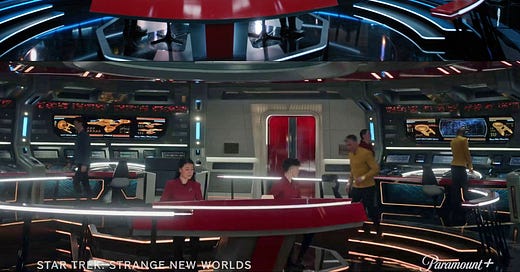SF/F Review - Warbound
Synopsis: A secret group of superheroes saves the Earth from an approaching planet-consuming alien in a 1930s noir setting.
Book Review: First the good parts – Larry Correia can spin one hell of a yarn! He writes a cool alternate-history world with fantastic settings, from a superhero prison to a walled-off Berlin filled with zombies. His pacing is good and his action scenes are riveting. I kept turning pages when I knew I really should be doing something else, which a mark of a good book. He does dead-pan humor extremely well, I laughed out loud several times. It’s exactly over-the-top enough to be a great ride, and very entertaining. When he sticks to doing what he does well he writes great fiction!
The book does have two major failings.
First, it falls into the Superman trap that many superhero stories stumble into. The primary actor in any scene has exactly the right amount of power to just barely overcome their obstacles. It doesn’t matter what the power-level of the threat is. If it’s a stab to the chest, they’ll barely survive. If it’s an army of goons they’ll suddenly be impervious to bullets and wade through them to get to the boss, and then barely survive the city-block-exploding powers of the boss. And they always have just the powers they need to make it through, which leads to things like Superman’s Brick-Laying Vision and that starts to take the tension out of things when you catch on. Larry tries to paper over this by emphasizing that they are pushing their power right to the limit, but there's only so many times you can read "he burned through the very last of his power" before it loses all impact. What's the downside of burning through your power again? You gotta rest of a few hours while your power bar fills back up? Good thing you didn't run through all your power until right at the very end of the boss fight. Again.
(also, how frikkin stupid is it that so few people have the Healing Kanji? Sullivan wouldn't even give it to his own side, and the entire human race was literally on the line. I guess it was more important to him that he stays the only super-special one. It made the faceless-goon fights boring, as they just died so easily.)
Secondly, Larry has long said that he’s opposed to message fiction, and thinks novels should be about entertaining the reader. This probably explains why he’s bad at writing message fiction – he probably hasn’t read much of it so he doesn’t know how to do it well. The first Correia book I read (Hard Magic) stuck to telling a great adventure tale. Warbound dabbles heavily in message fiction, and it brings it down. I can tell Larry has something to say, which is by far the most important part of writing message fiction, so I’m sure eventually he’ll be able to do it well, if he keeps working at it. But he’s new to this aspect of storytelling, so he blunders through it and makes a mess of things as he goes. For example – his exchange between Francis and the President of the USA (Roosevelt) is completely tone deaf as to how real people with lots of power actually talk. They act more like the puffed-up mayors of a large town than people who shape history. His portrayal of political power games could be most charitably called… naïve. It was so jarringly bad that I had to think for a while, then go back and re-read the entire passage while doing Roosevelt as the Nazi Major from Hogan’s Heroes. If your political commentary only makes sense when the other side is acting like a caricature, you really need to work on your knowledge of how politics is played at the higher levels. And while I realize Correia is politically to the right of me, this is a problem on both sides. It seems like both the left and the right really get off on portraying the other side as Evil Nazis, and it makes for both bad politics and bad writing.
More to the point, in good message fiction the message is an integral part of the story. You can’t remove the politics from a Heinlein novel without gutting it entirely. Much of the “message” in Warbound feels tacked on, and could easily be removed without affecting the story at all. The Active Camps served absolutely no function in the story. Neither did the bizarre non-sequitur line about “real” gold currency being replaced with worthless paper currency (which I realize is a bugbear of the radical wing of the libertarians, but seriously, wtf?) And good message fiction should maybe take just a step back sometimes and not assert that it is the answer to all of life’s problems (I’m looking at you Ayn Rand). In the epilogue Correia finally comes out and directly states that if everyone was like Sullivan, the world would be damn near perfect. “If there were enough like him, the world would be a very safe place to live in, without becoming too dull to be worth living in.” /sigh
There are also a few disturbing glimpses into what Correia idealizes. The characters are creepily joyful in the use of violence. They enjoy hurting the people on the “other side,” and at one point a character is disappointed that a confrontation was resolved before it could escalate to violence and he wouldn’t be able to kill anyone today. Women are treated as property to be protected rather than agents who can make their own decisions about their lives (Hammer is not allowed to join the men in saving the world because one of the men really likes her, and doesn’t want her to get hurt. Despite the fact that if they fail the entire world will be destroyed and she’s dead anyway, so they might as well fucking let her help out! Or even give her the option. Also when Lady Origami takes a lover an older man takes on the role of regulating her sexuality, telling the lover that he must now marry her or face his wrath. Because as a woman she can’t make her own choices, and must have her virtue protected or some shit?) However while these are things that make the book crappier in my eyes, they will make the book better for other readers. I’ve long been a proponent of doing things that make you less valuable to the general public if you can make yourself much more valuable to a specific audience. I’d rather be loved by some and hated by others than just kinda “meh” by everyone. So despite the fact that I disagree with him, I gotta give him props on the decision.
Still…. ewww.
Larry is a rising force, and I’d watch for his stuff. Eventually it will be flat-out amazing. But for now he’s still working out the kinks. In this particular case – Not Recommended.
Book Club Review: OK, just look at how many words I wrote above. I think this is my longest review yet. The man really gets you talking! Warbound is harder to give a Yes/No on than most books. It’s great for sparking discussion, which is the primary measure of a good Book Club book, so normally I would give it a hearty recommendation. However we had a smaller-than-normal turn out because several people simply couldn’t finish it. The action was too comic-book-esque, the violence too wanton, and the message parts too flimsy. We had a very wide range of scores. I think you may have to play it by ear, taking the composition of your particularly book club into account. I would give it a wary Recommended, with that caveat.








